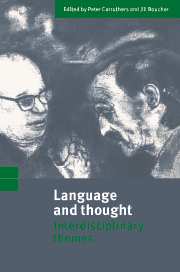Book contents
- Frontmatter
- Contents
- List of contributors
- Preface
- 1 Introduction: opening up options
- Part I Language, development and evolution
- Part II Language, reasoning and concepts
- Introduction to part II
- 6 Aphasic language, aphasic thought: an investigation of propositional thinking in an a-propositional aphasic
- 7 Representing representations
- 8 Magic words: how language augments human computation
- 9 The mapping between the mental and the public lexicon
- 10 Convention-based semantics and the development of language
- Part III Language and conscious reasoning
- References
- Author index
- Subject index
6 - Aphasic language, aphasic thought: an investigation of propositional thinking in an a-propositional aphasic
Published online by Cambridge University Press: 08 January 2010
- Frontmatter
- Contents
- List of contributors
- Preface
- 1 Introduction: opening up options
- Part I Language, development and evolution
- Part II Language, reasoning and concepts
- Introduction to part II
- 6 Aphasic language, aphasic thought: an investigation of propositional thinking in an a-propositional aphasic
- 7 Representing representations
- 8 Magic words: how language augments human computation
- 9 The mapping between the mental and the public lexicon
- 10 Convention-based semantics and the development of language
- Part III Language and conscious reasoning
- References
- Author index
- Subject index
Summary
Introduction
Aphasia is an acquired disorder of language in which, following a cortical lesion, a person who previously had normal language behaviour loses the ability to produce and understand linguistic messages. Aphasiologists generally operate with the tacit assumption that ‘thinking’ is unaffected by aphasia, although some might enter caveats about this assertion when referring to global aphasics and low-comprehension Wernicke's aphasics (more of them later). The source of this belief is twofold. First, information processing models of language, which provide much of the theoretical basis for contemporary aphasiology, postulate a level of knowledge which is pre-linguistic (in message production), and post-linguistic (in message comprehension) (e.g. Garrett, 1982). Aphasics generally (although not always – see Marshall et al., 1993, for an example case study) are seen as having difficulties in translating language to or from an underlying intact conceptual representation. Second, this assumption is grounded in interactions with people with aphasia where the impression gained is that one is dealing with a rational individual. The aphasic person has communicative intentions which they struggle to realise through language or through other communicative means, for example, drawing, pantomime gesture, and sometimes the communicative partner's language system. Thus some aphasic individuals appear expert in tool use, augmenting their damaged language faculties with both external and internal tools. In addition to wise use of communicative resources, many people with aphasia seem to have difficulties which are confined to a modular system which is not implicated in central cognition. Some aphasic individuals still drive cars, and most show appropriate behaviour across social contexts, attempt to solve everyday problems, are curious about the world, and show predictable frustration and distress at their communicative difficulties.
- Type
- Chapter
- Information
- Language and ThoughtInterdisciplinary Themes, pp. 128 - 145Publisher: Cambridge University PressPrint publication year: 1998
- 10
- Cited by



